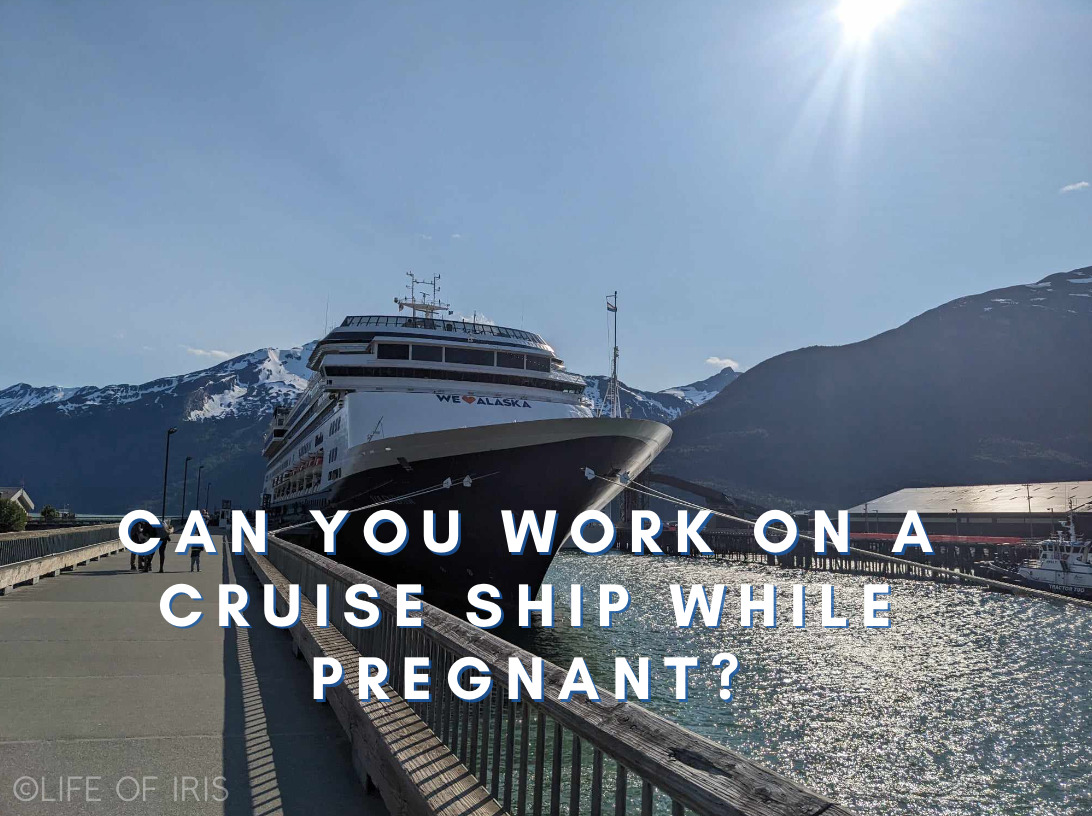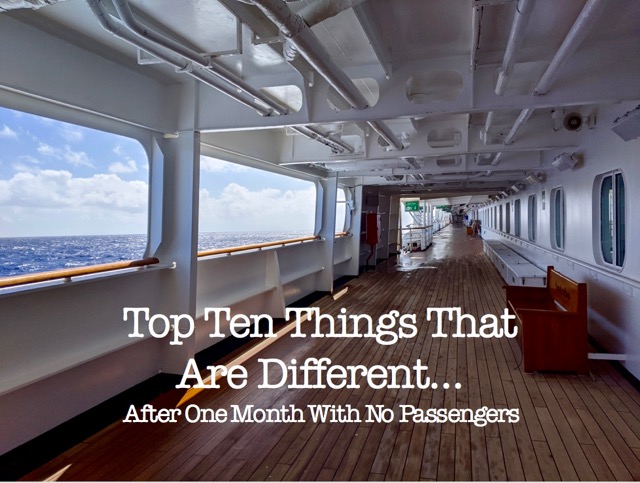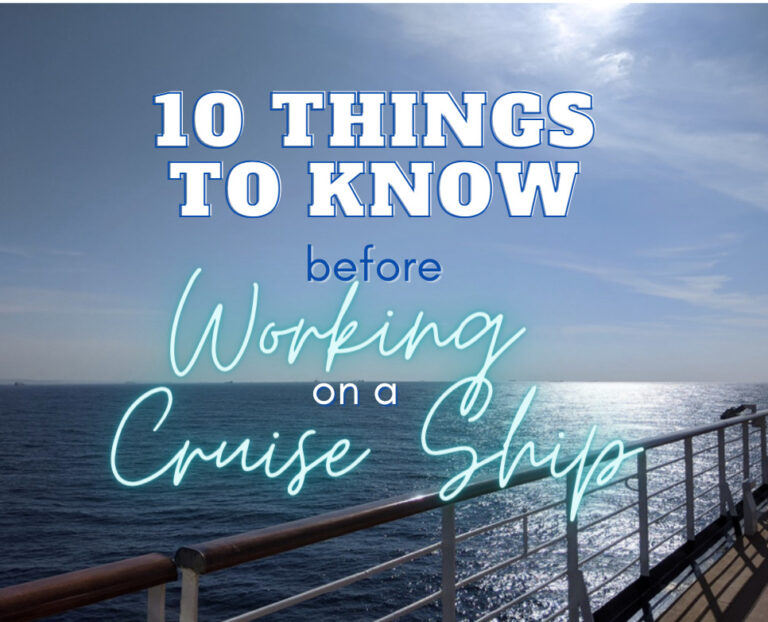Can You Work On a Cruise Ship While Pregnant?
Working on a cruise ship is hard work. It’s exhausting. It’s long hours. Just because you are away at sea doesn’t mean that the rest of life stops though. What happens if you are working onboard a cruise ship and find out you are pregnant? Can you work on a cruise ship while pregnant? Do they kick you off the ship in the next port? Do you keep it a secret? Do you all of a sudden stop going to the crew bar and figure no one will notice? (Personal experience: they notice)
Whether or not you can work on a cruise ship while pregnant is not answered with a simple yes or no. So much of it depends on the specific circumstance – how far along in the pregnancy, the age and health of the mother, where the ship is sailing, access to shoreside OB/GYN care, even whether or not the father is onboard can impact whether someone that is pregnant can stay working onboard a cruise ship. And, then even if they are allowed to by the cruise line – staying onboard might not be the right decision for that mother.
Finding out your pregnant while on a cruise ship contract can be a lot to handle – if you get to stay onboard it’s a lot of work and you are going through what might be the most tiring part of pregnancy – plus morning sickness and all the other fun pregnancy symptoms, and if you have to go home you need to deal with the other side of life. And, either way, if you are planning on carrying the baby to term, it’s going to alter your career, at least in the short term, drastically.
I found myself in this situation and I had lots of questions not just about the growing bundle of joy in my belly but about how this would affect my time and life onboard – and even further forward my career.

As always all views are my own and do not necessarily represent those of my employer.
I am not a medical doctor or medical professional. Being pregnant is a *big deal* that requires medical care. This post is based on my experience and the rules and regulations that allowed me to stay working onboard may not exist in your circumstance – whether that be different rules with your employer, a different medical history, the region where the ship is sailing, access to medical care, and so much more. This blog post is about my personal experience and is meant to shed some light to challenges seafaring women may face it should be taken for entertainment purposes only.
*If you have specific questions about your companies regulations I encourage you to check with your Human Resources Manager. However, I also encourage you to check your employee rules, regulations, and your contract for specifics and to advocate for your rights!
Why Would Being Pregnant Impact Your Ability to Work Onboard a Cruise Ship?
Cruise ships sail to remote parts of the world with limited access to outside medical care and the work or the emergency function you hold can be very physically demanding. Making sure that you and your growing baby are safe and healthy is the most important factor for whether or not you can stay working onboard. This is why what your job onboard is, what your emergency function is, where the ship is sailing, and your medical history – and likeliness for complications – can impact your ability to continue working on a cruise ship while pregnant.
Think of it this way – would you want to be sailing across the Pacific Ocean, thousands of miles from anywhere, 8 months pregnant, your baby is coming prematurely and you need an emergency C-section and the baby will need NICU care? While there is medical care onboard there is not medical care designed to handle all the variations of medical care needed for pregnancy complications for you or the baby.
What Should You Do If You Find Out Your Pregnant Onboard a Cruise Ship?
Most likely the official answer to this should be to go to the medical department ASAP. And, if you’re experiencing any sort of medical emergency make sure you get there as soon as possible. In fact, stop reading this and go. However, I felt a lot better going to medical when I knew what my companies general policy was in regards to pregnancy onboard. They say knowledge is power and while the onboard teams that I dealt with made sure I felt cared for and knowledgeable about my options, I am sure there are some medical teams out there that would make you think the only option – regardless of specific circumstance – would be to disembark you. Knowing what your companies policy is in regards to pregnancy and maternity leave pay can help you advocate for yourself throughout this time. Everyone onboard should act in yours and your baby’s best interest but no one will advocate for yourself (and your baby) like you will.
How can you find out your companies policies? Review your contract as well as the companies HR policies. Most companies have a computer system to look up policies. You can also contact your HR manager onboard. Or, if you are uncomfortable doing that have a friend ask for you or go with you. Before my own pregnancy I had gone to HR to find out for a friend what the policies were as she was pregnant and a bit nervous to go on her own. Also, it can prove helpful to get their answers in writing or in an email.
Aside from arming yourself with knowledge you will need to let the medical department know and typically you need to let them know pretty soon after you find out. There might even be something in your contract that you have to let them know within a certain amount of time.
Once you go to the medical department a whole bunch of things are put in motion. They will do an initial exam on you, confirm the pregnancy, and then go over next steps. Here’s where the path can diverge a bit depending on your specific circumstance. For the below we’re going to discuss based on keeping the pregnancy.
End of your contract and figure what’s the point in telling anyone, you’re going home pretty soon? Pregnancy is a big deal medically and you should be evaluated to make sure you are starting your pregnancy off healthy and well and taking the vitamins you should and not eating what you shouldn’t. Also, a big one – you might be eligible for maternity leave pay and considering you won’t be able to work onboard again for awhile – get that money!

Some Crew Members Are Allowed to Stay Working Onboard While Pregnant
There is no cruise line that will let you stay working onboard the ship up until your estimated due date. If you have a dream of delivering in the middle of international waters this is not your path to that.
At most cruise lines would allow you to stay working onboard through 24 weeks pregnant. This is actually the cutoff for passengers to sail onboard while pregnant, too.
To be able to be onboard at all though while pregnant there are a few things that need to happen and factors to consider:
- You have to go to a shore side OB/GYN to get checked out. This is usually at the expense of the seafarer. If you are sailing somewhere with expensive healthcare (looking at you USA) then staying onboard might not be for you as out of pocket expense without US health insurance might make going back to your home country (even with leaving work on the ship) more affordable.
- At the OB/GYN they will determine how far along you are and your estimated due date
- They will evaluate if you’re considered to have a high risk pregnancy
- High risk pregnancy could be things like:
- Maternal age. Age 35+ is considered a geriatric pregnancy (this needs to be renamed)
- Carrying multiples – such as twins
- Any medical conditions for the mom or anything they notice in blood work or ultrasound
- the OB/GYN and onboard team will consider your onboard role, emergency function, and where you are sailing. It’s worth noting that some roles (watch keeping, engineering type roles) onboard will sometimes only allow you to stay on through 3 months of pregnancy.
- Where you are sailing can play a role in your ability to get future OB/GYN care as well as care should something to wrong, so they may be hesitant to have you remain onboard if you’re sailing in a particularly remote area.
- Is there a partner and are they onboard?
- This might not be an official rule anywhere, but if your partner is onboard with you they can help you through those first few months of pregnancy and help keep an eye on your well-being. I felt so much better having my husband onboard with me.
- If your function onboard is particularly physically challenging – can accommodations be made?
- Personal Experience: I was in a very lucky situation that my role onboard was mostly in an office and I even had a laptop I could work from my cabin when morning sickness was particularly rough. My supervisors were incredibly supportive of making small adjustments to how I did my job to make it work. I had worked with both supervisors I had over this contract before, so I had an established working relationship with them that likely helped the situation.
It’s worth noting that even if you are able to stay onboard initially, you will have to keep up with your OB/GYN appointments shoreside and provide doctors notes to the shipboard team following each appointment saying that you’re still low risk and things are going well without complications.
Working on a Cruise Ship While Pregnant Was Hard – And I Had It Easy
Pregnancy is hard and tiring and a little scary and exciting. It is a lot of things. It also has a lot of fun symptoms that come with it. Going through pregnancy while on a cruise ship added a few extra challenges.
Before we talk about the ways I had it hard, let’s talk about the ways I had it easy. My life onboard was about the best it could be for being pregnant. My husband was onboard with me. My job, aside from some events and meetings, was mostly office work with a flexible schedule and I had a laptop where I could work from my cabin when my morning sickness or fatigue was too much. (Don’t worry, it wasn’t too cushy – it was still a cruise ship job where I was contracted for 70+ hours a week).
I could get room service, I had a fridge in my cabin, easy access to a microwave. I had a window and regular cell phone service for much of the contract (we were sailing in Alaska). I had a room steward to clean the room regularly. The onboard teams were supportive of me and my growing family – especially the shipboard management team. When I ran into a few challenges with benefits and maternity pay my shoreside supervisor helped me find the right people to talk to to get answers. I had friends that would leave me cupcakes on my desk – by all accounts, I could not have been in a better situation while working onboard a cruise ship to be pregnant. And it was still the hardest contract of my life and the only contract I’ve ever had that I thought about quitting because I wasn’t sure I had it in me to make it to the end.
Pregnancy Fatigue:
My cousin described it to me like being hungover but the hangover never goes away and this was hugely accurate for me. I was the most exhausted I’ve ever been, maybe even more so than the end of pregnancy. My job onboard offered me flexibility to work from my cabin some of the time and adjust my hours during the day. That didn’t mean not work or necessarily reduce my hours down that much, but rather I had the flexibility that if I was completely exhausted and needed to take an hour nap in the middle of the day I could. Most jobs onboard don’t have that flexibility.
Morning Sickness:
Everyone has heard the adage that morning sickness is not just in the morning. That’s accurate. On a ship it felt like exacerbated by seasickness (prior to this contract I’d only been sea sick twice in ten years at sea). Add to that when you’re on a ship if you show symptoms of norovirus you have to report it to medical and you will usually get isolated afterwards. The number of times I had to say to a coworker “I have to go throw-up but medical already knows”. It’s a confusing time where sometimes you end up telling people you wouldn’t otherwise tell way sooner than you wanted to.
Food Aversion and Food Availability
You would think that being on a cruise ship, surrounded by as much food as you could want would be a great place to be while pregnant. You want pickles and ice cream? That should be easy enough to get. If only it were. At lunch time maybe, but in the middle of the night? Not so much.
The job I had onboard would allow me to eat pretty much anywhere onboard. I could eat in the passenger buffet, the dining room, specialty restaurants, burger bar. In that way it was great. But, to eat in any of those places I need to be in uniform and looking professional (aka not looking like I just threw up). There are food options in the crew area but those hours are somewhat limited and includes less food options and less made-to-order food options.
Also, while cruise ships are known for having food available 24 hours a day, not all food is available at all hours of the day. So, I might have a craving for pasta but it was at breakfast time, or I might want ice cream when the crew mess wasn’t open, or maybe I wanted french toast but it was dinner time. Oh, or a grilled cheese sandwich at midnight. Or some mac and cheese (but not ship mac and cheese, either my homemade or a box of Annies). Maybe just something simple like pizza. You could also catch me daydreaming about those really good french fries that I could get back home but for the life of me could not find in Alaska.
Being onboard and having as much food as you want is great – if it’s the food you want that you can get in a comfortable way. Having to be in uniform to get a lot of the food and having cravings for foods that you had no way to get was hard. Let’s just say I ordered a lot of room service – but even that was only as helpful as I could get the food down.
Comforts of Home
Cruise ship crew cabins take a lot of forms. Being pregnant even in the early months can be uncomfortable. I am a bath person. They make my body feel better when it’s feeling a bit broken and can help make me feel more relaxed. I found myself wishing especially when I was particularly sick that a bath (but not too hot) was just what my body needed. Unfortunately for me my cabin onboard does not have a bathtub. Most crew cabins don’t – heck most cruise ship cabins for passengers don’t at this point either.
It’s Isolating
I am a social person. Between the fatigue and the nausea I found myself in my cabin more than usual. Friends would want to go out to eat ashore and I either had no energy for it or the thought of eating anything other then plain pasta would make me sick. Add to that that aside from those friends that I’d known for years onboard I wasn’t ready to tell people and while I felt incredibly supported over my contract I also felt isolated.
Looking back I think I may have told more people onboard. At least those that I had known for a bit longer. There were a lot of people I had just met last contract that I think probably find me a lot more standoffish and less fun than I actually am. I’m sure they would have been understanding and likely even supportive if I had told them what was going on but I had just met these people and some of them I may never see again. Why did it matter if I told them, then? Because of all the questions that came next.
Everyone Has Questions About Your Future Life Plans When You Are Pregnant on a Cruise Ship
When I say that everyone had questions, I mean that seemingly everyone had questions. Some people would keep their questions to themselves whereas others were a bit less subtle with their inquisitiveness.
Are you going to keep working at sea? Is your husband going to keep working at sea? How long can you stay onboard for? Wait, you can’t stay until the baby is born? Are you going to come sail? Babies can’t sail until they’re six-months old? Sometimes they can’t sail until a year old? Are you going to be a stay at home mom? If your husband keeps working at sea you’ll be home with the baby by yourself? Are you going to work? How does that work? Which country are you going to have the baby in? Will the baby get dual citizenship? You don’t automatically get dual citizenship for being married? How does that work? How long does your husband get off work? Will he be back in time for the baby being born? Will you get to keep your insurance? In the UK they have universal health care with the NHS, did you think about that? Oh, the baby is due just before Christmas, that’s too bad, I’m so sorry. (The last one is a direct quote from a group leader, said to me on the bow of the ship while looking out at Glacier Bay.)
While a lot of these questions are well-meaning and a lot of them come from a place of just not understanding how cruise ship careers work (or even seeing working on a cruise ship as a career), it’s a lot of questions and early on in my pregnancy I didn’t know the answers to them. I found out pretty early that even though it was isolating to not tell people, trying to deal with all of their questions and opinions while my husband and I were still trying to work through figuring out answers to any of our own questions was too much for me to deal with.
How Old You Are Is a Big Factor In Whether Or Not You Can Work On a Cruise Ship While Pregnant.
Geriatric is a word that might make you think of your grandpa. However, in pregnancy 35 is the ripe old age when a pregnant woman is then called “geriatric”. Yes, you read that right. The same phrase used to describe octogenarians is used to describe a pregnancy in a woman 35 and older.
Of course I hate the phrasing of this – however, name aside, 35 is the age where – even if everything is going normal and okay – becomes “high risk”. Onboard a ship they do not want to have someone onboard – especially someone working onboard – that has a high risk pregnancy.
So, if you are over 35 or will be turning 35 during your pregnancy – you can expect that you will be disembarked. What the company calls this disembarkation will depend on your company, but for the safety of yourself and your fetus you are considered medically unfit to fulfill your duties.
Does The Cruise Line Pay for Doctors Visits While Pregnant?
This is one where you will have to check your onboard policies and your contract. In my experience pregnancy care is not included for crew members by the cruise line – though in my case sailing in Alaska and being from the US my insurance (that I got through my job with the cruise line) covered (as much as insurance does anyways) my prenatal care. And, most cruise lines will require that to stay working onboard you need to have a clean bill of health from a shoreside OB/GYN to continue working onboard. This leaves the expense of prenatal visits on the crew member and this can vary hugely around the world.
How Long Can You Work Onboard While Pregnant?
The exact answer to this will depend on what your function onboard is and your ability to carry out that function. People in more physically demanding roles may only be able to stay onboard through 12 or 16 weeks pregnant while others may be allowed to stay through 22 or 24 weeks. All of this will be dependent on the specific pregnancy, medical history and health of the crew member. Even if your contract says you can stay onboard until 24 weeks if something comes up that could deem the pregnancy high-risk or be considered unsafe for you or the baby to stay onboard you will likely get sent home.
Most pregnancies go between 39 and 41 weeks and your estimated due date is typically set at 40 weeks. This means if you are disembarked before 24 weeks pregnant that is about 16 weeks, or 4 months before your due date.
Can You Get Fired from the Ship For Being Pregnant?
Getting fired is not an entirely accurate description of what might happen, but in reality, if you are pregnant you may not be allowed to continue to sail onboard. And at some point in the pregnancy you will get sent home. (They don’t want any little babies born out in the middle of the ocean!) Again, this isn’t that the crew member is getting fired, but rather a version of being medically disembarked. If a crew member is getting disembarked for being pregnant, it was most likely:
- the ship was sailing in a region without strong access to shoreside medical care. This could be that the itinerary was going to be sailing trans-oceanic or to more remote parts of the world.
- if you find yourself getting disembarked while pregnant for this reason but otherwise you are healthy and still fit for duty, it could be worthwhile to ask for a transfer to another ship in a region with better access to care and less sea days
- the crew member is sailing in part of the world where prenatal care is not covered by their health insurance (most health insurance is based on what country you are from) and the out of pocket expense is too much to make staying onboard worth it for the crew member so they choose to go home to get the necessary medical care
- The pregnancy is deemed “high-risk” for one reason or another. This could be based on medical history, it could be because of age – in general if you are 35 or older it is considered a “geriatric” pregnancy and automatically makes you high risk, perhaps you are carrying twins, or a multitude of other reasons a doctor might deem the pregnancy high-risk.
- You’ve reached the maximum number of weeks pregnant that a crew member can be onboard. Even if it is the most healthy and normal pregnancy, they don’t want babies born out at sea. There is a point where being on land is necessary for the health of both mom and baby. Because of this there will always be a point that a crew member during pregnancy needs to go home.
If You Are Disembarked for Being Pregnant – Who Pays for Your Flight Home?
Based on the MLC 2006 which is the labor organization agreement that governs the majority of cruise ships, the company must pay to repatriate you under Guideline B2.5:

Does the Cruise Ship Have a Doctor Onboard?
While cruise ships carrying more than a 100 people and regularly sailing voyages longer than 3 nights are required to have a doctor onboard. It’s worth noting though that the ships medical facilities may not be equipped to respond to every emergency.
The requirement for ships with over 100 people is based on MLC (Maritime Labour Convention) 2006, Standard A4.1(4)(b):

Can You Get a Medical Certificate While Pregnant?
To work on a cruise ship in nearly every capacity you need to have a medical certificate. Now, some functions like guest entertainers are in a bit of a different category with this, but if you are in a function that is considered “crew” to work onboard you will need a medical certificate.
The rules around medical certificates differ with which country issues yours. Which country you need to issue it depends on which company you work for and which type of certificate they will accept. One widely accepted medical certificate is the ENG-1 issued by the Maritime and Coastguard Agency of the United Kingdom.
MGN (Maritime Guidance Notice) 522 from the UK Government sections 5.2-5.9 relate to those seafarers requiring an ENG-1, and in particular 5.3 calls to reference ILO guidelines. Take a look through the various documents, but the base information is that a crew member is able to get a medical certificate and that a pregnancy is not considered an illness.

The ILO (International Labour Organization) calls that most pregnant seafarers can work until the 24th week of pregnancy:

Even Though Some Crew Members Can Continue Working Onboard Through Part of Their Pregnancy – It Nearly Always Means a Shift in Career
If you’ve spent time working onboard and building your career in the cruise industry, pregnancy can really change your career trajectory. This can be frustrating and can make you feel like you are living in an age of 50 years ago instead of in the 2020’s.
Aside from being able to work onboard through at least part of pregnancy; a normal pregnancy goes until 40 weeks – getting disembarked at 24 weeks leaves 16 weeks, or about 4 months of being off the ship and medically not being able to go back onboard. Additionally, most people do not want to go back onboard instantly after giving birth. Most likely you would be looking at being off ship for at least 6 months. Now, if you wanted to be able to bring your child onboard to sail onboard they need to be at least 6 months old to sail on some cruises and a year old to sail on all cruises. Want to be able to breastfeed your baby? That means you’re at home off the ship for at least 10 months. While the cruise line will possibly include some maternity pay, it’s not going to be 10 months worth.
This will send many women away from continuing their work onboard due to needing to earn money within those first years of the babies life. This is also a lot of why you see less women with families in high ranking positions onboard.







